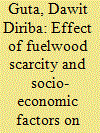| Srl | Item |
| 1 |
ID:
136232


|
|
|
|
|
| Summary/Abstract |
In Ethiopia biomass is predominantly utilized for household energy needs often using inefficient rudimentary stoves which cause adverse environmental and welfare effects. This paper examined the contribution of biomass resources to rural household energy use and energy substitution. The analysis applied the ordinary least square in the final stage estimation of fuelwood and overall biomass energy consumption by using predicted shadow prices. The paper used Tobit model to estimate charcoal and agricultural fuel consumption due to the presence of censoring. An increase in fuelwood shadow price was associated with reduced household fuelwood consumption with price elasticity of −0.38. The cross price elasticity between fuelwood and agricultural fuels revealed no evidence of energy substitution, which conforms to the findings of previous studies. Household access to electricity was associated with lower household biomass energy utilization but kerosene was not fuelwood substitute. Household energy use conformed to the ‘fuel stacking’ or ‘multiple fuel use’ concept, but households preferred modern energy options as welfare increased in areas where modern energy is available. This suggests that there is a promising prospect for fuel-transition, but access to modern energy and economic growth have key roles. The findings suggest that a concerted policy effort is required that would help diversify rural livelihoods, improve living standards and encourage economic growth, encourage inter-fuel substitution through improved modern energy access and afforestation to increase biomass supply.
|
|
|
|
|
|
|
|
|
|
|
|
|
|
|
|
| 2 |
ID:
145188


|
|
|
|
|
| Summary/Abstract |
Drawing on examples from rural Ethiopia and Uganda, this research note highlights some of the difficulties experienced in fieldwork. These difficulties do not justify the reluctance of increasingly risk-averse universities and funders to support independent fieldwork in Africa, but they do show that the rationale for research and the features of its design can provoke animosity and tensions. They also show that our own failure on occasion to appreciate local political dynamics made the situation more difficult. Challenges and threats came not only from local political forces but also from multinational companies and Fairtrade organizations uncomfortable with our findings and with fully independent research. The research note argues that the details of our experience have a practical value for other researchers, and that at least some of them should be treated as substantive forms of evidence and insight, rather than simply as threats or failures. We conclude that some crude best-practice norms and pressures on academics to form partnerships to conduct policy-relevant work may undermine the potential for truly independent and intensive field research. However, crises should not necessarily be seen as an unwelcome interruption to smooth processes of research; they can illuminate the context and power relations that the research is trying to understand.
|
|
|
|
|
|
|
|
|
|
|
|
|
|
|
|
| 3 |
ID:
099369


|
|
|
|
|
| Publication |
2010.
|
| Summary/Abstract |
Most of the reports about the reaction of the Ethiopian regime to the blow that it suffered in the 2005 elections focus on its institutional evolution, and conclude that it took a turn towards even stronger authoritarianism. Observations made in a rural community in south-east Amhara State reveal that it reacted first, until the end of 2009, by a whole range of the deepest reforms since its takeover in 1991. These combined a stronger grip of the ruling party in all areas with a 'liberalisation' of the rural development strategy and first steps towards local 'good governance'. They were embodied in the rise of the traditional rural elite which had been ostracised for years, as if the regime was trying to build its new constituency on it. But at the end of 2009 the local authorities suddenly returned to the all-encompassing authoritarian attitude characteristic of the pre-2005 period. This 'liberalisation' could thus be seen as merely a tactical interlude, conceded by a ruling party still driven by its Leninist legacy and the Abyssinian 'culture of power'.
|
|
|
|
|
|
|
|
|
|
|
|
|
|
|
|